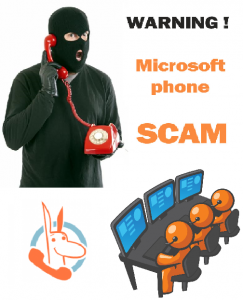Microsoft Fake Tech Support Scam


In my previous blog, I discussed a very elaborate scam involving fake representatives of Microsoft tech support, and how they were involved in scamming thousands of unsuspecting victims. Well, once again – with great regret – I have learned that these scammers are back in business with more persistence and aggressiveness. In fact, this scam campaign is so belligerent – it’s scary.
Even after being shut down by the Federal Trade Commission, recent spikes in complaints from Microsoft confirm that this campaign to dupe its customers has intensified – according to recent report published by Microsoft.
In the past two weeks, Newsoftwares.net has investigated these claims, and found that newer tactics are being employed. The scam campaign employs aggressive sales and marketing strategies, combined with half-truths (mainly used to convince their victims). In case you didn’t read my past blog, and don’t know how the scam works, I will explain it again. The scam involves a Microsoft customer receiving a phone call from countries such as India or the Philippines. The caller (the scammer) on the end explains to the customer that there is problem which needs to be fixed on their PC immediately – otherwise their PC could crash and all the data would be lost – if they want the problem fixed – the customer would have to allow the technician to remotely access his or her PC. Those who are most likely to be duped are the elderly and the less-tech-savvy. Once the fraudsters are able to gain remote access to victims PC, they usually ask for compensation to have the problem fix, if the victim refuses, the scammer may delete important system files – or other files which may corrupt Windows.
This scam was first reported in 2010, and then picked up steam in 2011. In 2012, the FTC tried shutting this fraud racket down. However, it seems like this scam is still ongoing and experts say that It has become more aggressive than ever before. Some have also resorted to stealing personal data in case of non-payment, thus leading to identity theft. Expert warn all Microsoft users that they should password protect folders containing sensitive/personal data, regardless of any chances of falling victim to such scams.
If you feel that you have received a phone call involving a telephone scam, you can complain to the Federal trade commission online:
https://www.ftccomplaintassistant.gov/#crnt&panel1-1
Although, the FTC may not help you with your individual case, it does take your complaint into consideration, which will later be used in conjunction with other complaints for prosecuting those who are responsible behind this scam.
However, experts warn that bringing the perpetrators to justice is no easy feat. According to Ned Banister, data security analyst at Newsoftwares.net, prosecuting such individuals is virtually impossible. According to Bannister, “Since these scams are being played around in countries such India and Philippines, the FTC does not hold jurisdiction in these countries, and therefore, its efforts will be futile”.
Microsoft Security Scam Going Around
Yes, there are many scams that use Microsoft’s name. These scams usually involve someone claiming to be from Microsoft and asking for personal information or payment for services. They may also try to get you to download malicious software or pay for unnecessary services. It is important to be aware of these scams and never give out personal information or money to anyone claiming to be from Microsoft.
Get Rid Of Microsoft Scam Pop-Up
No, there is no way to undo a signup. Once you have signed up for something, you will need to contact the service provider to cancel or change your signup.
Does Microsoft Offer Tech Support?
Yes, Microsoft offers free tech support through its website, telephone, and chat services. You can also get help from Microsoft’s community forums and Answers website. Additionally, Microsoft offers paid support services that can help you with more complex technical issues.
Things Happens When Scammer Gets Access To Computer
If a scammer gets access to your computer, they can potentially steal your personal information, install malicious software, or even use your computer to launch attacks on other computers. It is important to be aware of the risks associated with online scams and take steps to protect yourself. This includes using strong passwords, avoiding suspicious emails, and using anti-virus software.
Report A Microsoft Scammer
If you believe you have been the victim of a Microsoft scam, you can report it to Microsoft. You can do this by visiting the Microsoft Support website and selecting the “Report a Scam” option. You will be asked to provide information about the scam and any evidence you have that the scam occurred. Microsoft will then review the information and take appropriate action. You can also report the scam to the Federal Trade Commission and your local law enforcement agency.
Payment Of Microsoft Support
Microsoft does not publicly disclose the salaries of its support staff. However, according to Glassdoor, the average salary for a Microsoft Support Engineer is $82,000 per year.
Does Microsoft Still Have Chat Support?
Yes, Microsoft still offers chat support. You can access this service by visiting the Microsoft Support website and selecting the “Chat” option.
Is Technical Support Free?
No, technical support is not typically free. Depending on the type of support you need, you may need to purchase a support plan or pay a fee for each incident.
How Do I Know If An Email From Microsoft Is Real
Microsoft will never send you an email asking for personal or financial information, or asking you to click on a link or open an attachment. If you receive an email from Microsoft that looks suspicious, you can report it by forwarding it to abuse@microsoft.com.
What Does A Tech Support Scammer Say?
Tech support scammers typically try to convince you that your computer is infected with a virus or other malicious software and that you need to purchase a specific product or service to fix the problem. They will often ask for credit card information, or use scare tactics to pressure you into purchasing their product or service. It is important to remember that Microsoft does not make unsolicited phone calls or emails and will never ask for your personal or financial information.
What Does A Tech Support Scam Look Like?
Tech support scams typically involve a caller or email claiming to be from a reputable tech company such as Microsoft, Apple, or Dell. The caller or email will attempt to convince you that your computer is infected with a virus or other malicious software and that you need to purchase a specific product or service to fix the problem.
Way To Investigate A Scammer
To investigate a scammer, you should first contact the relevant authorities in the country where the scammer is based. You can also contact the company they claim to be from and ask for more information. Additionally, you can search online for any complaints or reports about the scammer. Finally, you can check any social media accounts associated with the scammer to see if they have any suspicious activity.
Info That A Scammer Need
Scammers typically need personal information such as name, address, date of birth, Social Security number, bank account numbers, credit card numbers, or other financial information.
Banister warns that users should avoid all calls that involve paying money, and if your gut tells you something is wrong – then trust your gut feeling.
